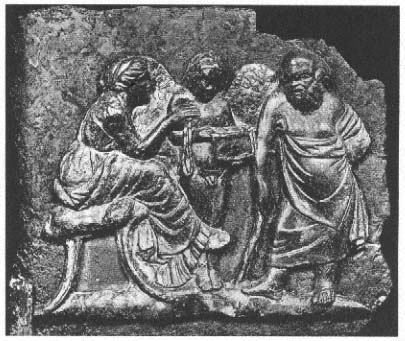Greece in the Archaic Period was made up from independent states, called Polis, or city-state. The social classes applied to men only, as women all took their social and legal status from their husband or their male partner. Women in ancient Greece were not permitted to take part in public life.
Greek Society was mainly broken up between Free people and Slaves, who were owned by the free people. As Athenian society evolved, free men were divided between Citizens and Metics. A citizen was born with Athenian parents and were the most powerful group, that could take part in the government of the Polis. After compulsory service in the army they were expected to be government officials and take part in Jury Service. A metic was of foreign birth that had migrated to Athens, to either trade or practice a craft. A metic had to pay taxes and sometimes required to serve in the army. However, they could never achieve full right s of a Citizen, neither could they own houses or land and were not allowed to speak in law courts.
By 600 bc chattel slavery (treating slaves as property) had become widespread in Greece. By the 5th century BC slaves accounted for as much as one-third of the total population in some city-states. Children born to slaves became slaves themselves. Greeks took many slaves from non-Greek populations, but they also enslaved other Greeks in war.
Slaves were used as servants and labourers, without any legal rights. Sometimes the slaves were prisoners of war or bought from foreign slave traders. Although many slaves lived closely with their owners, few were skilled craftsmen and even fewer were paid.To encourage slaves to work hard, owners sometimes promised freedom at a future date.
Unlike in Rome, freed slaves in Greece did not become citizens. Instead, former slaves mixed into the population of metics—non-citizens, including people from foreign lands or other states, officially allowed to live in a city-state.
City-states and gods also legally owned slaves (the gods’ slaves were generally managed by the gods’ earthly intermediaries, temple priests). These public slaves enjoyed a measure of independence, living on their own and performing specialized tasks. In Athens, for example, public slaves were trained to look for counterfeit coinage. Temple slaves worked as servants of the sanctuary’s deity. Sparta had a special category of slaves called helots, Greek war captives owned by the state but assigned to Spartan families. Helots raised food and performed household chores so that Spartan women could devote their time to raising strong children and men could devote their time to training as hoplite warriors. The helots lived harsh lives and often revolted. Spartans annually sent out a secret band of young men to murder any helots who looked likely to provoke rebellion.

No comments:
Post a Comment